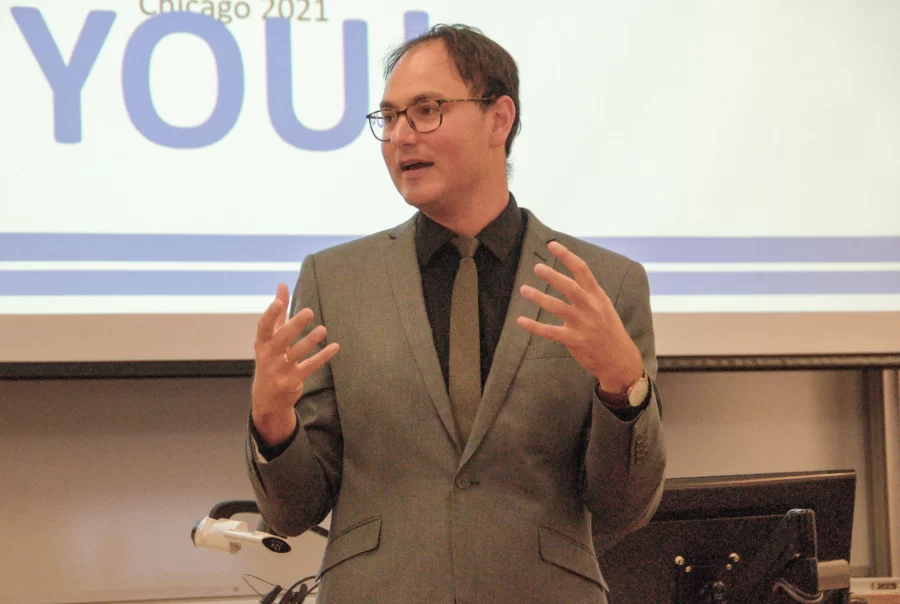Deputy Consul General of Israel to the Midwest leads lecture on Israeli innovation, entrepreneurship
Daniel Aschheim, the Deputy Consulate General of Israel to the Midwest, holds a lecture called “Recipe for a Start-Up Nation: “Chutzpah,” Innovation, Academia and Everything in Between” on Wednesday.
Oct 28, 2022
In the Business Instructional Facility, a packed lecture hall full of students and a few adults patiently waited, chatting while a lecture was being set up at the front of the room.
On Wednesday, Daniel Aschheim, the deputy consulate general of Israel to the Midwest, held a lecture at the BIF titled “Recipe for a Start-Up Nation: “Chutzpah,” Innovation, Academia and Everything in Between.” The lecture focused on many aspects of Israeli innovation and entrepreneurship that have allowed the country to become the home of many startups and business centers.
Jeffrey Brown, dean of Gies College of Business, started by addressing anyone in the room who may have opposing beliefs to the lecture’s focus.
“I understand there are some deep issues here that we’re not going to agree on, and that’s OK,” Brown said.
Brown said that while there was no issue with disagreement, he asked the crowd to keep things respectful.
Get The Daily Illini in your inbox!
Marissa Siero, director of experiential learning at Gies, said she appreciated this statement from Brown.
“I thought that Dean Brown’s comments to kick off the lecture were really important to set a stage of inclusive and diverse thought and to really address anyone that was in the room and to set a very safe space for open dialogue,” Siero said.
After a short moment, Brown introduced Aschheim, who took his place at the front of the room. The crowd silently listened, all eyes on Aschheim. Aschheim greeted the crowd by saying “shalom,” a common Jewish greeting.
Before Aschheim began his lecture, he approached the crowd, asking many in the audience to give him the first word that came to their minds when they heard the word “Israel.” He got a myriad of answers in response, including “Jewish,” “holy” and “conflict.”
The beginning of Aschheim’s lecture focused on Israel’s success in entrepreneurship, saying that there is one startup for every 1,600 people and that around 300 companies have R&D centers. He explained that many factors have contributed to this.
Aschheim explained how the country has benefited from diversity in innovation, expanding to many different things instead of narrowing down on one field. He explained that various technologies have started in Israel, such as instant messaging and water conservation.
Aschheim elaborated on how Israel got to this point. He explained that while many countries focus on improving technology gradually, Israel aims to rapidly adapt to an ever-changing ecosystem and develop the needed technology.
“First of all, (technology has come from) the need,” Aschheim said. “Israel, a small country in 1948, the vast majority of the land was desert, no water sources, desert land, no vegetation, and how do you create from nothing? So you need to find solutions for a new nation coming into a difficult landscape.”
Aschheim also explained that the startup nation can be split into five parts that spur innovation: culture, the Israeli Defense Force, immigration, government support and individual luck.
Focusing on immigration, Aschheim said it is important to listen to diverse viewpoints.
“When we come together as a group, we may hate each other, but sometimes, the other side has a point,” Aschheim said.
Aschheim took extra time to discuss the essential Israeli culture that promotes entrepreneurship, including failure being okay, risk-taking, (over)confidence, “Chutzpah,” a results-focused approach, and a nonhierarchical business landscape.
Siero, who teaches AHS 494: Entrepreneurship for Veterans, brought many of her students to the lecture. She said she hopes they will walk away with a better understanding of the relationship between culture and entrepreneurship.
“I really hope that this allowed my students to maybe think differently and expand their thoughts about the global view of entrepreneurship,” Siero said. “How culture can be impacted and influenced in entrepreneurship. And really to expand and expose thought (about how) innovation and entrepreneurship is a very global topic.”
Following the lecture, a Q&A was held. One audience member asked about challenges in integrating other cultures while still sticking to entrepreneurial values, which Aschheim answered by establishing the importance of diversity.
“Embracing diversity is hard because it requires you to change your mindset,” Aschheim said. “But if you do it, the benefits are huge.”
After the Q&A, some attendees left, but many stayed, speaking with other audience members and event organizers about their reactions.
Aschheim said that he hoped this lecture helped to show students the opportunities of Israeli entrepreneurship.
“I think me being here today in meeting with students and faculty allows these conversations not to remain on the theoretical level, but also to explore opportunities for students to see how they can really work with the Israeli ecosystem on their entrepreneurship,” Aschheim said.
Aschheim said what he wants the audience to walk away with most is curiosity.
Aschheim also said that he was very happy with the audience’s participation.
“The engagement was fantastic,” Aschheim said. “There were to-the-point questions and the discussion was great. And I think it was a cultural interaction that we both shared, so I learned a lot from them.”






